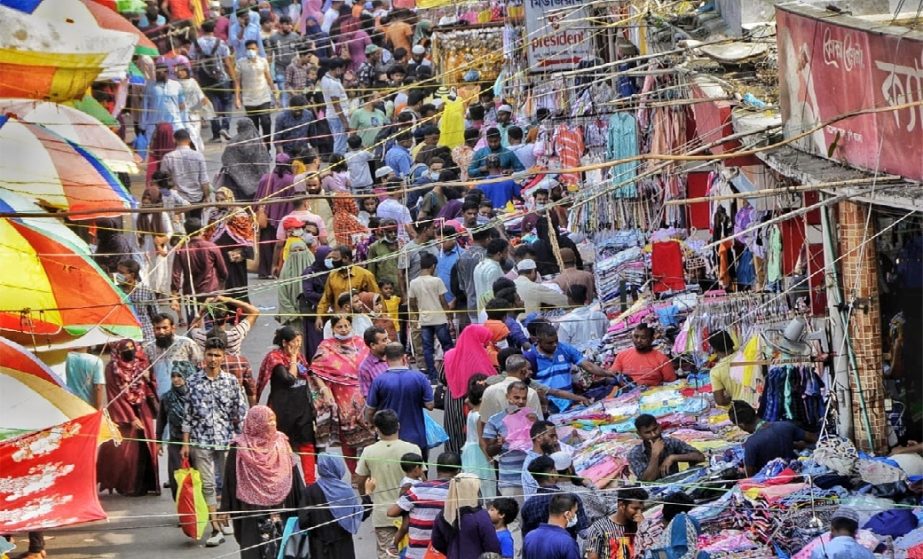
UNB, Dhaka :
As Eid-ul-Fitr is knocking on the doors, many poor and low-income people look to be on shopping sprees like the well-off classes, as everyone gets ready to celebrate the biggest religious festival with their near and dear ones.
Shoppers on low-budget are swarming the makeshift shops on footpaths and open spaces for buying dresses of their choices and other desired items, including shoes, sandals, cosmetics and jewelry, at cheaper prices.
Hundreds of temporary shops have been set up on the footpaths and open spaces in the most busy areas of the city, targeting mainly the low-income group of eid shoppers.
According to vendors, many middle-class buyers are also flocking to their stalls as they have outfits of various colours and designs and all other products like that of the posh shopping malls at reasonable prices.
The footpath sellers also said they are drawing good customers as people have got a chance for shopping in full swing after a break of two years due to the coronavirus pandemic.
Visiting different parts of the city on Thursday and Friday, it was seen that people were crowding around the makeshift shops in Gulistan, Bangabazar, Mothijheel, Baitul Mukarram , Paltan, New Market, Jatrabari, Fakirerpool, Mouchak, Rampura, Badda and Mirpur areas.
The vendors were seen trying to woo customers by displaying various items of girls’ attires, children’s clothes, cosmetics, men’s, wears like jeans and gabardine pants, shirts, T-shirts, panjabis, trousers, footwear, belts, caps, lungis, wallets and toys.
Most customers there said they are shopping at the footpath stalls as they cannot afford expensive items at the posh shopping malls.
“I got my bonus today (Thursday) from three families I work for. So, I came here to buy some clothes for me and my husband and two daughters. I bought a shirt for my husband at Tk 300 and a dress for me at Tk 400. I am now looking for dresses for my two girls,” Halima Khatun, a domestic help, told UNB in front of a footpath shop in Mouchak area.

Halima said she will also buy some cosmetics and footwear from the footpath shops. “The price of every item is a little higher due to eid occasion, but still things are very cheaper here than in regular malls.”
Najmul Islam, a private job holder, said he purchased a panjabi for his father, some clothes for his mother and a shirt and jeans pant for his younger brother from makeshift shops in the city’s Gulistan area. “I could not buy anything for my family during the eid occasions in the last two years as my company did not give me the bonus. As this time I got the bonus, I am buying eid gifts for my family members who live in Lalmonirhat.”
He said good products are available in the makeshift shops at a cheap rate. “I’m happy with what I bought from here as the prices are reasonable. I don’t have much money to buy these items from shopping malls at exorbitant prices. I think footpath shops are blessings for low-income people like me. No one should look down upon the footpath shops.”
Rickshaw puller Sanaullah was seen buying shirts and pants for his two school-going sons in a roadside shop in New Market area. “I will go home on Sunday night. My two sons are waiting for me to get new Eid dresses. I am happy that I got new dresses for them here at prices within my buying capacity.”
The huge turnout of shoppers brought smiles to the owners and sellers of the makeshift shops in the city.
A vendor in the city’s Motijhlee area said he is happy over the sale and profit in his makeshift shop this year. “I’m doing good business as sales volumes and profits this year are higher than the previous years. The sale was not good at the beginning of Ramadan. But it continues to increase after 15th Ramadan.”
Another vendor, Selim in New Market area, said sales are going well. “We even have no time to talk. People are now doing last-minute shopping. It will continue till the Eid day morning.”
Abul Kalam, a vendor who sells different types of pants and shirts on footpaths in Mirpur-10 area, said he made a good profit this time with huge sales of his products.
Most vendors, however, alleged that they have to pay the toll to local political leaders and law enforcers to continue running their businesses on the footpaths.

